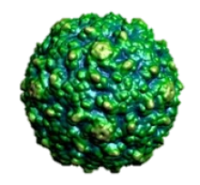
General Information
Enteroviruses are a family of viruses that include polioviruses (viruses that cause polio) along with other non-polioviruses such as coxsackieviruses and echoviruses. Non-polioviruses are easily mutated, and there are over 60 types of non-polioviruses.
Non-polio enteroviruses are very common, and are estimated to cause 10 – 15 million infections in the United States each year. These infections are most likely to occur in the summer and fall. Only the common cold (rhinovirus) is a more common viral infection. Anyone can get infected with non-polio enteroviruses, but infants, children and teenagers are more likely to get infected and become sick because they have not yet built immunity to the virus through previous exposures.
Significance
Enterovirus disease came to national attention in the fall of 2014 when the United States Centers for Disease Control and Prevention (CDC) identified an acute outbreak of Enterovirus D68 (EV-D68). This outbreak sent hundreds of children to the hospital, primarily in the Midwest and Southeast states.
Enterovirus D68 (EV-D68) is one of many non-polio enteroviruses. This virus was first identified in California in 1962, but it has not been commonly reported in the United States until now.
The recent EV-D68 outbreak in the United States has increased interest in enterovirus infections because like other enteroviruses, EV-68 causes a respiratory illness primarily in children, but it is unusual because it is causing more severe symptoms. The reason health officials are concerned this year is that there have been so many hospitalizations.
Symptoms
Non-polio enteroviruses cause a variety of different illnesses. Most infections are generally mild, with people often showing either no symptoms while infected or mild cold-like symptoms. In other cases, symptoms can be severe enough to warrant intensive care in the hospital.
- Mild symptoms may include fever, runny nose, sneezing, cough, and body and muscle aches.
- Most of the children who got very ill with EV-D68 infection in Missouri and Illinois had difficulty breathing, and some had wheezing. Many of these children had asthma or a history of wheezing.
- In rare cases, enteroviruses can attack the central nervous system and cause paralysis or even death.
Transmission
Infection can occur when there is close contact with an infected person. Enteroviruses are spread from person to person through contact with nasal secretions, saliva, or stool from an infected person, or by contact with surfaces contaminated with bodily secretions from an infected person.
While anyone can become infected with enterovirus, infants, children and teenagers are more likely to become infected and get sick because they have not developed immunity from past exposures. Infants, children with asthma or anyone with a weakened immune system seem be to be more at risk of complications or a severe illness.
Treatment
There is no specific treatment for people with respiratory illness caused by EV-D68 or other non-polio enterovirus infections. Fortunately, most instances of infection lead to mild illness that resolves on its own, or does not cause any illness. For those with mild respiratory illness, symptoms can be relieved by taking over-the-counter medications for pain and fever. They usually recover completely. However, some illnesses caused by non-polio enterovirus can be severe enough to require hospitalization.
There are no antiviral medications or vaccines available today.
Prevention
You can help protect yourself from respiratory illnesses by following these steps:
- Wash hands often with soap and water for 20 seconds, especially after using the toilet or changing diapers.
- Avoid touching eyes, nose and mouth with unwashed hands.
- Avoid close contact with those who are sick, including touching, shaking hands, hugging, kissing, and sharing food.
- Clean and disinfect frequently touched surfaces, such as door knobs and toys, especially if someone is sick.
Also, see a graphic that shows these prevention steps.
The following is recommended for patients with EV-D68 and other common viral respiratory illnesses:
1) Droplet isolation
2) Appropriate and frequent cleaning and disinfection of environmental surfaces and patient care equipment
3) Frequent hand hygiene
4) Respiratory hygiene/cough etiquette to prevent the spread of contaminated respiratory secretions.
Guidelines and Recommendations/Resources
Additional information is available at: http://www.cdc.gov/non-polio-enterovirus/
Cleaning and Disinfection of Environmental Surfaces
Diligent environmental cleaning and disinfection and safe handling of potentially contaminated materials is essential.
Due to the rarity of the Enterovirus D68 (EV-D68), there are not specific disinfectant efficacy claims for (EV-D68) available to date. The CDC recommends the use of an EPA-registered, hospital disinfectant for suspected or confirmed non-polio Enteroviruses.
Diversey disinfectants have been tested and shown to be efficacious against Poliovirus and Rhinovirus as well as several other non-enveloped viruses when used in accordance with label instructions:
See table of recommended disinfectants in the PDF link below.

